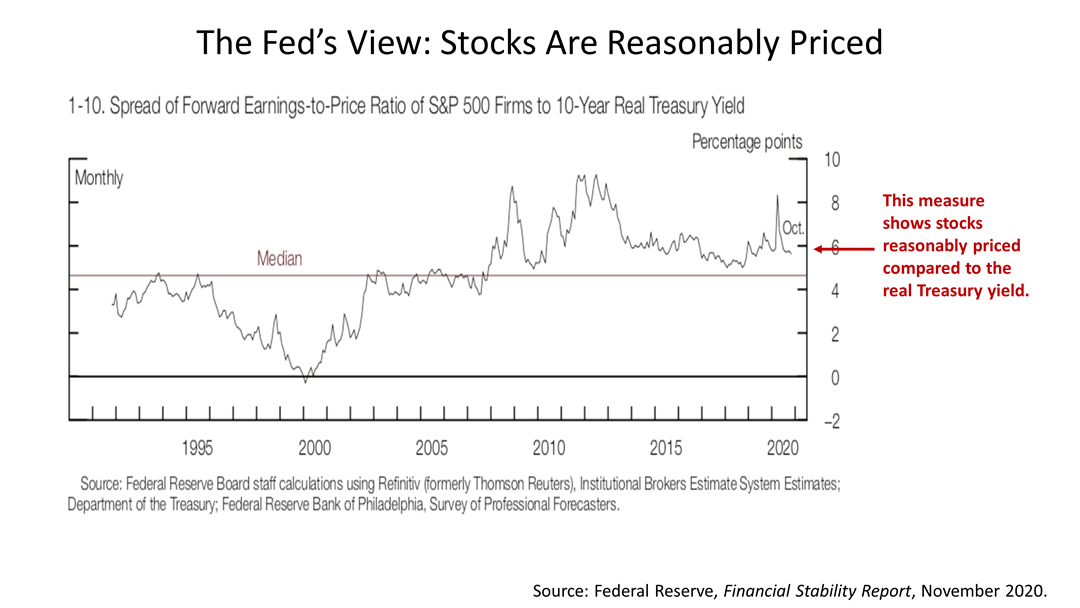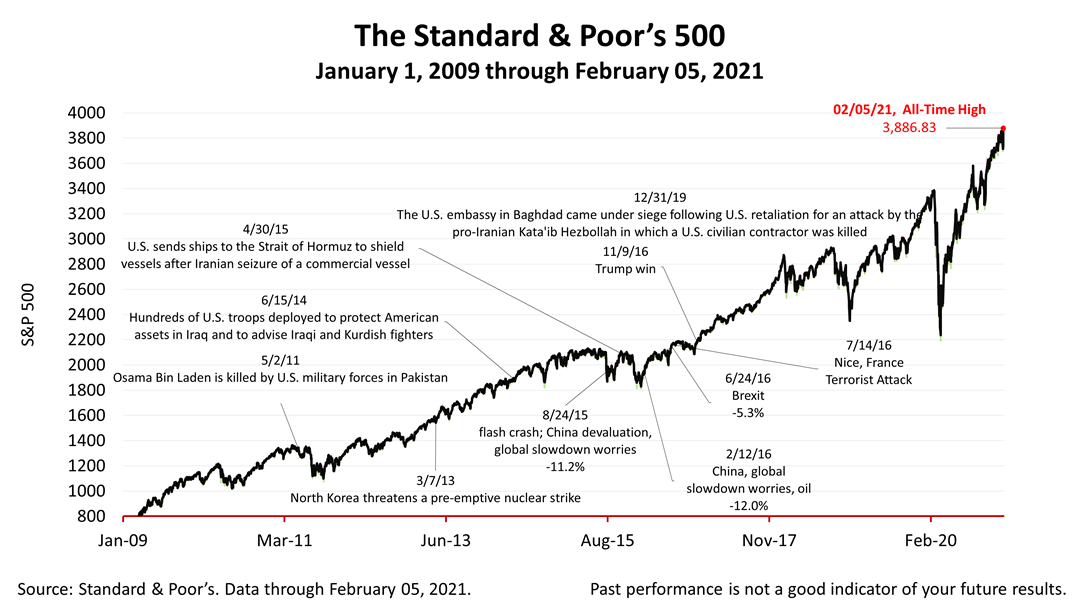Stocks Closed At A New Record High: Can The Party Last?
Published Friday, February 5, 2021 at: 7:50 PM EST

Major stock indexes closed the week at a new all-time high price!
With bond yields low, not a whiff of inflation in the air, and a strong recovery expected in the second half of 2021, the Federal Reserve nonetheless remains unlikely to pull the punch bowl anytime soon. Here’s why.
Buried in the Financial Stability Report published by the Fed twice annually every November and May since 2018 was a chart in which the Fed outlines its view of stock market valuations. This key metric compares the profit expected to be earned by the companies in the Standard & Poor’s 500 over the next 12 months versus the inflation-adjusted 10-year yield of U.S. Treasury bonds. It shows that even as the S&P 500 is breaking records stock prices are reasonable compared to bonds.
Although the price-to-earnings ratio of stocks is high by historical standards, current valuations are in line with the low-yield, low-inflation of the past 13 years. Fed Chair Jerome Powell said recently that “vulnerabilities overall are moderate,” referring to this risk of an asset bubble in stocks. All this is evidence that the Fed will remain accommodative and is not going to raise interest rates anytime soon. Nor is the Fed concerned with inflation.
The Fed is not planning on pulling the punch bowl from the party anytime soon.
The Standard & Poor’s 500 stock index closed Friday at an all-time high of 3,886.83. The index gained +0.39% from Thursday and is up +4.54% from last week, and +53.86% higher than the March 23rd bear market low.
Nothing contained herein is to be considered a solicitation, research material, an investment recommendation, or advice of any kind, and it is subject to change without notice. It does not take into account your investment objectives, financial or tax situation, or particular needs. Product suitability must be independently determined for each individual investor. Tax advice always depends on your particular personal situation and preferences. The material represents an assessment of financial, economic and tax law at a specific point in time and is not intended to be a forecast of future events or a guarantee of future results. Forward-looking statements are subject to certain risks and uncertainties. Actual results, performance, or achievements may differ materially from those expressed or implied. Information is based on data gathered from what we believe are reliable sources. It is not guaranteed as to accuracy, does not purport to be complete, and is not intended to be used as a primary basis for investment decisions. Any investments or strategies referenced herein do not take into account the investment objectives, financial situation or particular needs of any specific person. The material represents an assessment of financial, economic and tax law at a specific point in time and is not a guarantee of future results.
This article was written by a professional financial journalist for Preferred NY Financial Group,LLC and is not intended as legal or investment advice.
An individual retirement account (IRA) allows individuals to direct pretax incom, up to specific annual limits, toward retirements that can grow tax-deferred (no capital gains or dividend income is taxed). Individual taxpayers are allowed to contribute 100% of compensation up to a specified maximum dollar amount to their Tranditional IRA. Contributions to the Tranditional IRA may be tax-deductible depending on the taxpayer's income, tax-filling status and other factors. Taxed must be paid upon withdrawal of any deducted contributions plus earnings and on the earnings from your non-deducted contributions. Prior to age 59%, distributions may be taken for certain reasons without incurring a 10 percent penalty on earnings. None of the information in this document should be considered tax or legal advice. Please consult with your legal or tax advisor for more information concerning your individual situation.
Contributions to a Roth IRA are not tax deductible and these is no mandatory distribution age. All earnings and principal are tax free if rules and regulations are followed. Eligibility for a Roth account depends on income. Principal contributions can be withdrawn any time without penalty (subject to some minimal conditions).
©2021 Advisor Products Inc. All Rights Reserved.


